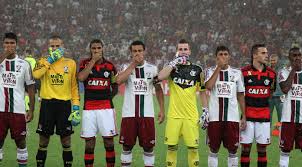June 8 – The governor of Rio de Janeiro has green-lighted a return to practice for football clubs this weekend, but Rio’s town hall is not prepared yet to allow the Carioca championship’s resumption.
On Monday, commerce will partly be allowed to reopen in the state of Rio de Janeiro, including in its capital city as the right wing governor Wilson Witzel seeks to revive the economy. But his decision to permit football’s return doesn’t mean matches in the state championship will return any time soon.
Clubs are allowed to practice now, even though Flamengo, Brazil’s reigning champions, broke quarantine rules in the past few weeks by practicing without authorisation. The Rio club ignored health restrictions amid Brazil’s erratic response to the coronavirus pandemic. Rio’s football federation had authorised the restart of practice some weeks ago, but was instantly overruled by local government.
The Carioca capital is one of Brazil’s most affected cities and the city’s mayor has suggested football can return in July at selected venues with capacities reduced to a third but only after a series of games have been played behind closed doors. The venues that would used are the Maracana, Sao Januario and the Nilton Santos stadium.
But the mayor still cautioned against too much optimism. Rio’s town hall will only authorise the resumption of the local championship after a re-evaluation of the pandemic on June 17.
In Sao Paulo, plans for the resumption of the game and the return of the Paulista championship will be announced on Tuesday. Sao Paulo clubs agreed to not train, but Red Bull Bragantino broke that gentlemen’s agreement.
The slow and small steps in a fractured football landscape are the first signs that football in Brazil is slowly returning to action, even if the country is in meltdown following the incendiary rants of its President Jair Bolsonaro. Brazil’s head of state has been a proponent of football’s return, arguing that that there is little risk, since the players are young, healthy athletes.
But Brazil has been rattled by the scale of the coronavirus pandemic. South America’s largest country has 691,758 confirmed cases and 36,455 people have passed away after contracting the virus, according to the latest data from the Johns Hopkins University. However, in recent days Bolsonaro has questioned the validity of the ministry of health’s statistics, sparking fears that his government might be hiding the true scale of the health crisis. At present, Brazil has no ministry of health.
In March, the Brazilian FA (CBF) responded to the outbreak of the virus by reluctantly suspending all national football competitions for an indefinite period. Soon after, the state federations abandoned the state championships.
The truncated calendar and logistics of a huge national territory will leave Brazilian football grappling with the 2020 fixtures list. In April, the national championship was supposed to kick off. As a consequence of the delay, the CBF has already indicated that the national league might run through to January 2021, which in turn would threaten the orderly start of the 2021 state championships, the lifeblood of Brazil’s provincial clubs.
Contact the writer of this story, Samindra Kunti, at moc.l1734942747labto1734942747ofdlr1734942747owedi1734942747sni@o1734942747fni1734942747

